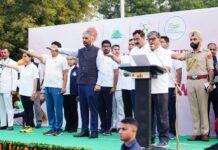Met Director Chandigarh released Infographics to Aware the General Public During and After the Floods
Today, the Director of the India Meteorological Department, Chandigarh, along with the Head of the Department of Community Medicine and School of Public Health, PGIMER, released Infographics to inform the general public about the best practices during and after the floods.
Shri Manmohan Singh, Director, India Meteorological Department, Chandigarh, stressed that there are visible changes in the weather pattern. Shri Singh highlighted that extreme weather conditions are becoming more common due to climate change. Recently, northern India recorded high frequency and intensity rainfall in a short time, leading to flood situations. He mentioned awareness about flood risk management will increase the community’s resilience for their own safety.
On the occasion, Prof. Arun Kumar Aggarwal, Head, Department of Community Medicine and School of Public Health, PGIMER, highlighted that floods are the most frequent natural disaster resulting in loss of life and personal property damage. He added that floods severely affect critical public health infrastructure, restricting fast emergency relief. Prof Aggarwal specifies that individuals can adopt simple practices to minimize health and valuable asset losses, as highlighted in the flood infographic. He urged engaging and informing the public as a part of flood preparedness to minimize precious life and economic losses.
Flood infographics are designed and developed by Dr. Ravindra Khaiwal, Professor of Environment Health, Department of Community Medicine and School of Public Health, Post Graduate Institute of Medical and Research, Chandigarh and Dr. Suman Mor, Associate Professor, Department of Environmental Studies, Panjab University, Chandigarh, along with Indian Meteorological Society, India. Both specifically acknowledged the support from Prof. Renu Vig, Vice-Chancellor, Panjab University and Prof. Vivek Lal, Director, PGIMER, Chandigarh.
Dr. Suman Mor mentioned that flood infographics aim to educate readers of all ages and are currently available in three vernacular languages. She added this work is a part of the ‘Community Environmental Empowerment Program (CEEP)’ project funded by the Ministry of Environment, Forest & Climate Change, New Delhi, India.
Prof. Khaiwal mentioned that flood pictorial booklet guides about flood water and associated public health risks to minimize them. He added that public health concerns about floods could be early, immediate, or after the flood water is receded. They include drowning, infectious diseases and post-traumatic stress disorder can occur. He added that the public should follow the local official and weather guidelines. Dr. Khaiwal stressed that we must stay away from flood water and follow good hygiene practices to minimize flood-related risks.
The first poster on ‘Floodwater Precautions’ illustrates essential measures during floods. It covers guidelines on safe drinking water practices, personal hygiene, and public health risk involved during floods. The second poster, ‘Returning Home after Floods,’ provides safety advice for reoccupying homes and communities after floodwaters have receded. It highlights steps for inspecting and cleaning buildings, assessing potential hazards, and ensuring a safe living environment.
Both posters are released in three languages–English, Hindi, and Punjabi, to maximize their reach and benefit diverse communities across the nation and can be downloaded from https://www.care4cleanair.com/awarnessmaterial or their institutional websites.












